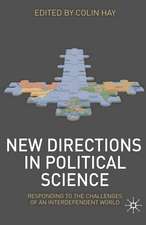Groundless Existence: The Political Ontology of Carl Schmitt
Autor Dr. Michael Marderen Limba Engleză Hardback – 15 sep 2010
| Toate formatele și edițiile | Preț | Express |
|---|---|---|
| Paperback (1) | 255.84 lei 43-57 zile | |
| Bloomsbury Publishing – 18 apr 2012 | 255.84 lei 43-57 zile | |
| Hardback (1) | 889.23 lei 43-57 zile | |
| Bloomsbury Publishing – 15 sep 2010 | 889.23 lei 43-57 zile |
Preț: 889.23 lei
Preț vechi: 1281.62 lei
-31% Nou
Puncte Express: 1334
Preț estimativ în valută:
170.15€ • 178.13$ • 140.79£
170.15€ • 178.13$ • 140.79£
Carte tipărită la comandă
Livrare economică 07-21 aprilie
Preluare comenzi: 021 569.72.76
Specificații
ISBN-13: 9780826465955
ISBN-10: 0826465951
Pagini: 208
Dimensiuni: 152 x 229 x 16 mm
Greutate: 0.44 kg
Ediția:New.
Editura: Bloomsbury Publishing
Colecția Continuum
Locul publicării:New York, United States
ISBN-10: 0826465951
Pagini: 208
Dimensiuni: 152 x 229 x 16 mm
Greutate: 0.44 kg
Ediția:New.
Editura: Bloomsbury Publishing
Colecția Continuum
Locul publicării:New York, United States
Caracteristici
The book provides a new reading of Schmittâ?Ts work, examining it against the double background of phenomenology and existentialism.
Cuprins
List of Abbreviations: The Works of Carl Schmitt
Introduction: On the Possibility of a Non-Objectivist Political Ontology
Part I - The Elements
Chapter 1 - Geometry of the Exception: The Point and The Line
To the Point
Beyond the Line
The Extremism of the Middle Point
Chapter 2 - The Danger: Unavoidability of Risk
A Taxonomy of Risk
Whence Political Risk? The Anthropological Minus the Economic
Risky Recognitions
Risky Decisions
Chapter 3 - The Non-Ground: From the Concept of the Political to the Event of Politics
A Philosophical Primer: Snapshots of the Event in Heidegger and Derrida
There is no Such a Thing as the "Political Sphere"!
Schmitt's Anti-Economism Revisited: Nomos / Appropriation, Politics / Expropriation
How to Remain Faithful to the Event of Politics?
Chapter 4 - Politics in Question
Prelude: Questioning the Question
Posing the Question
Interlude: Yes or No?
In Place of a Response...
Part II - The Critique
Chapter 5 - Metonymic Abuses of Modernity
In the Name of the Law...
Constitutional Unity, Constitutional Details
The Fragility of the Status and the Irreducibility of the Political
Chapter 6 - Political Reduction to Constitutive Subjectivity
Schmitt and Husserl: From the Crisis
The Ontology of Political Will
P.S.: On Political Consciousness
Part III - On the Ground
Chapter 7 - Living Forms: Culture, Multiculturalism and the Complexio Oppositorum
Disentangling Complexio Oppositorum
The Living Forms of Politics
A Virtuous Circle: The Mutual Invigoration of Culture and Politics
Multiculturalism: A New Complexio Oppositorum
Chapter 8 - Political Hermeneutics: The Necessity of Interpretation
Schmitt and Gadamer: Decision and Interpretation
Politics as Interpretation
Interpreting the Meaning of the Political
Political Theology as a Hermeneutic Endeavor
Introduction: On the Possibility of a Non-Objectivist Political Ontology
Part I - The Elements
Chapter 1 - Geometry of the Exception: The Point and The Line
To the Point
Beyond the Line
The Extremism of the Middle Point
Chapter 2 - The Danger: Unavoidability of Risk
A Taxonomy of Risk
Whence Political Risk? The Anthropological Minus the Economic
Risky Recognitions
Risky Decisions
Chapter 3 - The Non-Ground: From the Concept of the Political to the Event of Politics
A Philosophical Primer: Snapshots of the Event in Heidegger and Derrida
There is no Such a Thing as the "Political Sphere"!
Schmitt's Anti-Economism Revisited: Nomos / Appropriation, Politics / Expropriation
How to Remain Faithful to the Event of Politics?
Chapter 4 - Politics in Question
Prelude: Questioning the Question
Posing the Question
Interlude: Yes or No?
In Place of a Response...
Part II - The Critique
Chapter 5 - Metonymic Abuses of Modernity
In the Name of the Law...
Constitutional Unity, Constitutional Details
The Fragility of the Status and the Irreducibility of the Political
Chapter 6 - Political Reduction to Constitutive Subjectivity
Schmitt and Husserl: From the Crisis
The Ontology of Political Will
P.S.: On Political Consciousness
Part III - On the Ground
Chapter 7 - Living Forms: Culture, Multiculturalism and the Complexio Oppositorum
Disentangling Complexio Oppositorum
The Living Forms of Politics
A Virtuous Circle: The Mutual Invigoration of Culture and Politics
Multiculturalism: A New Complexio Oppositorum
Chapter 8 - Political Hermeneutics: The Necessity of Interpretation
Schmitt and Gadamer: Decision and Interpretation
Politics as Interpretation
Interpreting the Meaning of the Political
Political Theology as a Hermeneutic Endeavor
Recenzii
In this marvelous book, Marder set out to expose the hermeneutic nature of Schmitt's political ontology as no one has ever done before. Through a deconstructive reading, Schmitt's political philosophy is put in a dialogue with contemporary thought, giving politics new ontological vitality. Not only Schmitt scholars but also all those interested in the meaning of politics after deconstruction will find this book to be an indispensable text. A genuine "must read." --Gianni Vattimo and Santiago Zabala, authors of Hermeneutic Communism
"Michael Marder's brilliant explication of the philosophical content of Carl Schmitt's political theory is, at the same time, a profound exploration of the very possibility of political philosophy in the wake of phenomenology, existentialism and deconstruction. No one has written more lucidly or insightfully on Schmitt's philosophical standing and on the fundamental problems of the political. Groundless Existence is the new gold standard in Schmitt scholarship and an indispensable point of reference in political philosophy."--Russell Berman, Professor of German Studies and Comparative Literature & Walter A. Haas Professor in the Humanities, Stanford University
Brilliantly revisiting Schmitt's concepts in the context of a political ontology understood within an existential-phenomenological framework, Michael Marder furnishes one of the most powerful, original and interesting reflections on Carl Schmitt's work from a philosophical point of view. --Alexandre Franco de Sá, Professor of Philosophy, University of Coimbra, Portugal
Tracing Schmitt's ideas to their philosophical underpinnings and beyond to their very essence, the human experience, Michael Marder breaks new ground in Schmitt scholarship. -- George Schwab, Professor Emeritus, CUNY
Marder's book is a significant contribution to understanding Schmitt's philosophical underpinnings and political ontology. It facilitates a fresh and innovative conversation about possible politico-philosophical links between Schmitt, phenomenology, existentialism, and deconstructivism.
"Michael Marder's brilliant explication of the philosophical content of Carl Schmitt's political theory is, at the same time, a profound exploration of the very possibility of political philosophy in the wake of phenomenology, existentialism and deconstruction. No one has written more lucidly or insightfully on Schmitt's philosophical standing and on the fundamental problems of the political. Groundless Existence is the new gold standard in Schmitt scholarship and an indispensable point of reference in political philosophy."--Russell Berman, Professor of German Studies and Comparative Literature & Walter A. Haas Professor in the Humanities, Stanford University
Brilliantly revisiting Schmitt's concepts in the context of a political ontology understood within an existential-phenomenological framework, Michael Marder furnishes one of the most powerful, original and interesting reflections on Carl Schmitt's work from a philosophical point of view. --Alexandre Franco de Sá, Professor of Philosophy, University of Coimbra, Portugal
Tracing Schmitt's ideas to their philosophical underpinnings and beyond to their very essence, the human experience, Michael Marder breaks new ground in Schmitt scholarship. -- George Schwab, Professor Emeritus, CUNY
Marder's book is a significant contribution to understanding Schmitt's philosophical underpinnings and political ontology. It facilitates a fresh and innovative conversation about possible politico-philosophical links between Schmitt, phenomenology, existentialism, and deconstructivism.
Notă biografică
Michael
Marder
is
Ikerbasque
Research
Professor
in
the
Department
of
Philosophy
at
the
University
of
the
Basque
Country,
Vitoria-Gasteiz.
He
is
the
Associate
Editor
ofTelos:
A
Quarterly
Journal
of
Critical
Thoughtand
the
author
ofThe
Event
of
The
Thing:
Derrida's
Post-Deconstructive
Realism(2009).















